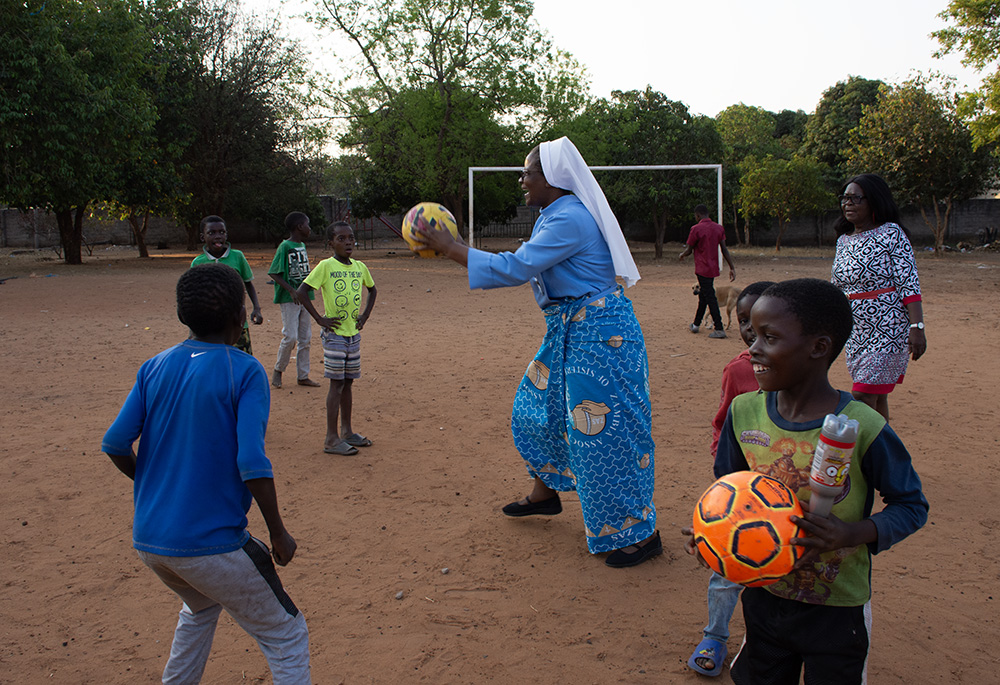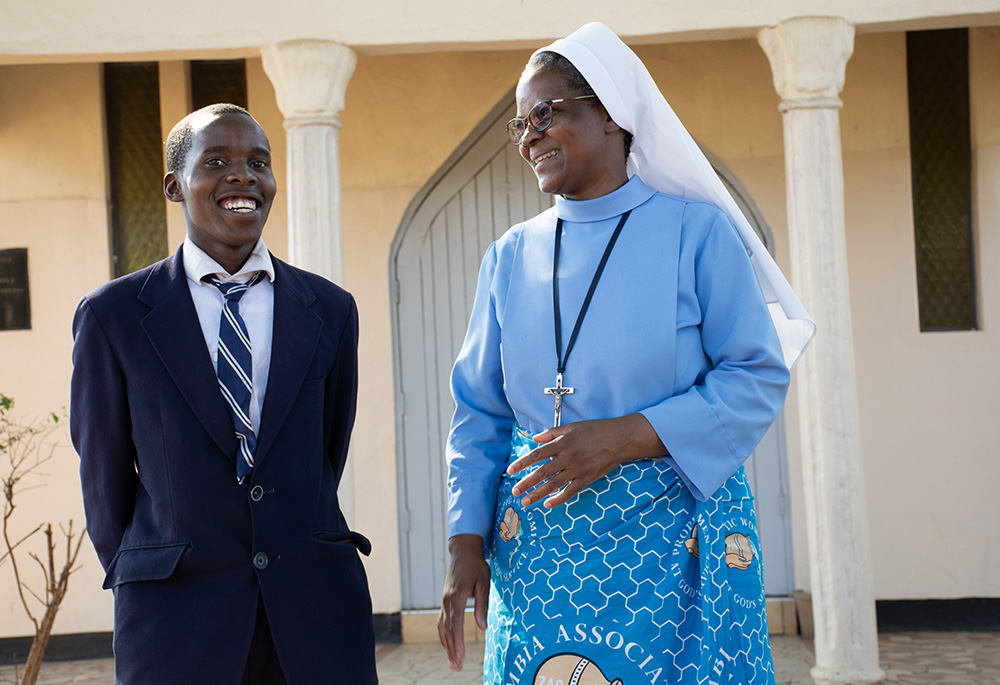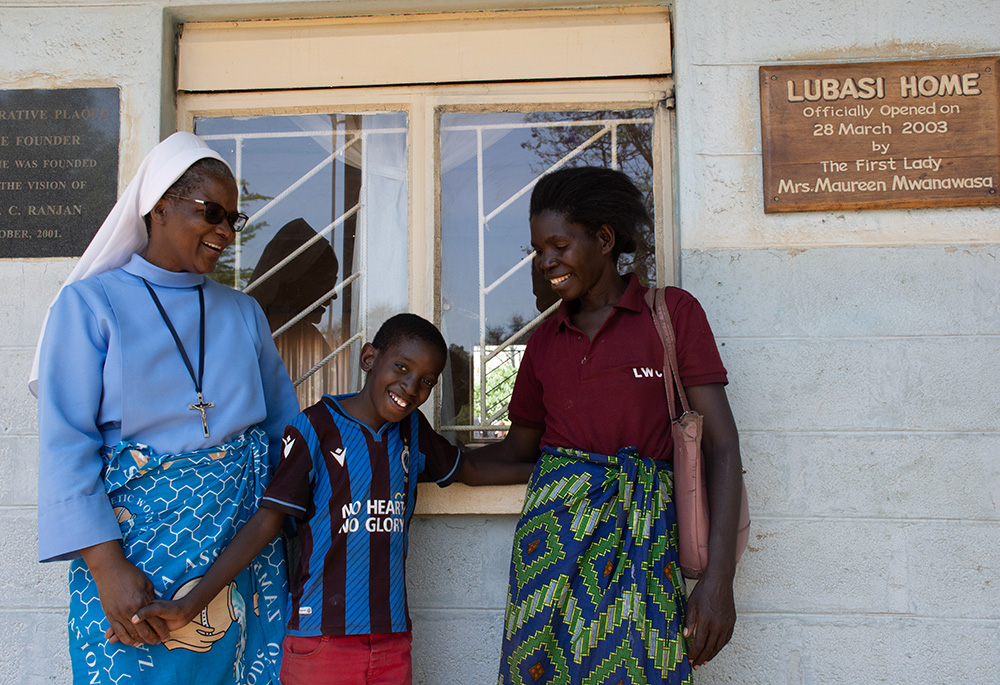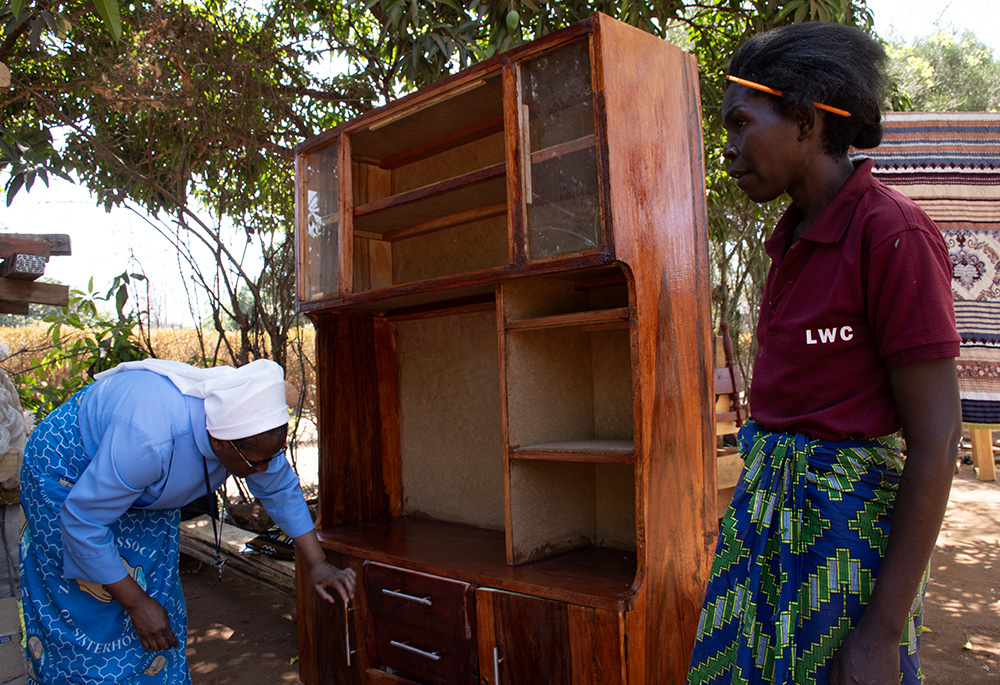
Sr. Catherine Mpolokoso, with senior staff members at Lubasi Home, joins some of the children to play some games at the facility in Livingstone, Zambia. Lubasi Home offers care to abandoned, neglected, vulnerable and orphaned children. They also reintegrate children into loving families through foster care and adoption. (Derrick Silimina)
Timothy Siazanga, a grade 10 student at Linda Secondary School, walks home after class, braving the sweltering afternoon heat while anxiously yearning to see his mother at her home on the outskirts of Zambia's tourist destination — Livingstone, about 480 km (or 297.6 miles) south of the capital, Lusaka.
He spoke to Global Sisters Report about a stressful ordeal he went through after his father died in 2014.
"A year after dad and mum got divorced, dad became very sick and died. Our relatives [took] all his properties, including a herd of cattle he had entrusted me," said the 17-year-old.
"I fled from Choma following my paternal relatives' abuse. I then got stranded on the streets of Livingstone while looking for my mum's place. Luckily, the police rescued [me] and [brought] me to Lubasi Home."
Just like Siazanga, Ackray Munsaka is one of over 1,000 vulnerable children who have passed through Lubasi Home, a facility offering care and protection to abandoned, neglected, vulnerable and orphaned children. They also reintegrate children into loving families through foster care and adoption.

Timothy Siazanga shares a light moment with Sr. Catherine Mpolokoso of the Little Servants of Mary Immaculate at Lubasi Home in Livingstone. (Derrick Silimina)
Munsaka's grandmother, Eneles Phiri, said her grandson's poor health deteriorated due to his family's negligence after they discontinued his antiretroviral treatment.
Phiri explained that Livingstone General Hospital helped to restore his health. After he recovered, the medical authorities involved with the Department of Social Welfare brought him to Lubasi Home.
"I am grateful to the government and Lubasi Home for taking a swift decision to save his life," she said.
Lubasi Home was founded in 2001 by Anthony Ranjan, who was involved in community schools in Mwandi, Linda and Libuyu townships following the death of his son in 1995. The Sri Lanka-born Catholic sought to safeguard the lives of vulnerable children and restore their dignity.
Lubasi, a Lozi name that means family, has been a place of hope and love since it was founded in 2001. The facility officially opened its doors in 2003 after receiving support from Zambia's former first lady Maureen Mwanawasa.

Eneles Phiri, right, connects with her grandchild, Ackray Munsaka, at Lubasi Home in Livingstone. (Derrick Silimina)
Research has shown that babies and young children raised in institutions can experience substantial developmental delays, and larger delays seem to be associated with prolonged stays.
Therefore, Zambia is making progress in its quest to shift orphans and other vulnerable children from institutional care to family-based care so that children are raised in a safe, loving family or within a community to realize their full potential.
For this reason, Lubasi Home, one of the 33 Catholic-affiliated child care residential facilities supported by the Zambia Association of Sisterhoods, or ZAS, has taken a pivotal step in transitioning children from institutional care to a nurturing family environment.
"We picked Lubasi Home in Livingstone and St. Martin's in rural Ndola as a pilot project in line with the government's reintegration policy due to their locality and the high number of children admitted," said Sr. Catherine Mpolokoso, of the Little Servants of Mary Immaculate and ZAS project coordinator. She added that over 60 vulnerable children have been successfully reunited with their families.
Advertisement
Mpolokoso, who joined the Zambia Association of Sisterhoods in 2019 when the child reintegration drive was in its second phase, said the pilot project went up to 2022 and covered phase one, and ZAS took over in the second phase. The project is currently in its third phase until 2026. They have now added three more child care facilities to the reintegration process.
The Zambia Association of Sisterhoods' case review committee meetings assessed every child in its facilities and established that not every child could remain in child care. Family members were contacted, and parents understood the need to take their children home.
Mpolokoso, 48, said that since 2019, many family beneficiaries in Livingstone who have reunited with their children from Lubasi Home have received empowerment packages, including skills training. They have also set up cooperatives, tailoring and carpentry, among other entrepreneurial ventures, to ease the burden of those looking after their children.
Eneles Phiri said, "I am indebted to ZAS for my empowerment package worth K3,600 [$138], which has boosted my carpentry business. I made over K8,000 [$308] worth of furniture."

Sr. Catherine Mpolokoso inspects some of the furniture made by Eneles Phiri for sale in Livingstone. (Derrick Silimina)
Requesting anonymity, Melody — a beneficiary of an empowerment package before reunification with her nephew — told GSR how her young sister abandoned her 5-year-old son at Lubasi Home. Progress is being made to reunite the child with the family before the end of this year, and Melody has been given a sewing machine from the Zambia Association of Sisterhoods to have a sustainable income to support her nephew.
With the help of the Department of Social Welfare, Lubasi Home and the Zambia Association of Sisterhoods have been working closely with relevant government agencies with the transfer of guardianship.
"Our collaboration with ZAS and Lubasi Home has been a success," said Olipa Manenga, Livingstone District assistant social welfare officer. She added that they have guidelines on reintegrating a child, preparing families for reunification and ensuring they are financially stable to support a child. Children are also psychologically and emotionally prepared to facilitate a smooth family reunification.
Mpolokoso, a registered nurse and midwife, is upbeat that reintegration efforts are in the best interest of the child and the family.
"Since 2019, so many parents have been empowered. In 2020, we built a two-bedroom house for a family. We are yet to empower seven more families by 2025."






